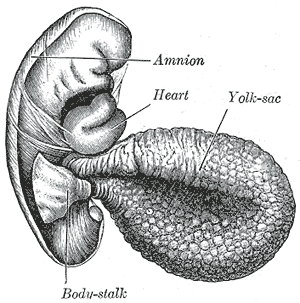Amnion
(Redirected from Amnios (biology))
Amnion is a thin but tough sac of membrane that encloses the embryo or fetus in the uterus of mammals, birds, and reptiles. It is an essential part of the placenta and the amniotic fluid that it contains helps to cushion the fetus, providing it with a protective environment that is crucial for its development. The amnion is one of the several membranes that serve to protect and sustain the life of the developing offspring, and it plays a key role in the reproductive system of amniotes, a group that includes these three classes of vertebrates.
Structure and Function[edit | edit source]
The amnion is developed from the embryonic disc, a process that begins early in the embryonic development. It grows to completely enclose the embryo, forming a fluid-filled cavity known as the amniotic cavity. The fluid, amniotic fluid, serves several functions; it acts as a shock absorber, protecting the embryo from physical shocks, prevents adhesion of the embryo to the surrounding tissues, and maintains a constant temperature around the embryo.
The amniotic fluid is initially formed from maternal blood, and as the fetus grows, it contributes to the fluid by excreting urine into the cavity. This fluid exchange is crucial for the fetus's development, as it allows for the movement necessary for the growth of muscles and bones.
Clinical Significance[edit | edit source]
The amnion and its fluid play a critical role in prenatal health. Abnormalities in the amniotic fluid volume, such as polyhydramnios (too much amniotic fluid) or oligohydramnios (too little amniotic fluid), can indicate or lead to complications in pregnancy. These conditions can affect the fetus's development and lead to complications during delivery.
Amniocentesis is a medical procedure that involves sampling the amniotic fluid using a needle inserted into the uterus through the abdomen. This procedure can provide valuable information about the health of the fetus, including genetic conditions, infections, and lung maturity.
Evolutionary Significance[edit | edit source]
The evolution of the amnion is a significant event in the history of vertebrates. It allowed for the transition of life from water to land by providing an "aquatic" environment for the developing embryo, thus reducing the dependency on water for reproduction. This adaptation is seen as a key factor in the success of amniotes on land.
See Also[edit | edit source]
Search WikiMD
Ad.Tired of being Overweight? Try W8MD's physician weight loss program.
Semaglutide (Ozempic / Wegovy and Tirzepatide (Mounjaro / Zepbound) available.
Advertise on WikiMD
|
WikiMD's Wellness Encyclopedia |
| Let Food Be Thy Medicine Medicine Thy Food - Hippocrates |
Translate this page: - East Asian
中文,
日本,
한국어,
South Asian
हिन्दी,
தமிழ்,
తెలుగు,
Urdu,
ಕನ್ನಡ,
Southeast Asian
Indonesian,
Vietnamese,
Thai,
မြန်မာဘာသာ,
বাংলা
European
español,
Deutsch,
français,
Greek,
português do Brasil,
polski,
română,
русский,
Nederlands,
norsk,
svenska,
suomi,
Italian
Middle Eastern & African
عربى,
Turkish,
Persian,
Hebrew,
Afrikaans,
isiZulu,
Kiswahili,
Other
Bulgarian,
Hungarian,
Czech,
Swedish,
മലയാളം,
मराठी,
ਪੰਜਾਬੀ,
ગુજરાતી,
Portuguese,
Ukrainian
Medical Disclaimer: WikiMD is not a substitute for professional medical advice. The information on WikiMD is provided as an information resource only, may be incorrect, outdated or misleading, and is not to be used or relied on for any diagnostic or treatment purposes. Please consult your health care provider before making any healthcare decisions or for guidance about a specific medical condition. WikiMD expressly disclaims responsibility, and shall have no liability, for any damages, loss, injury, or liability whatsoever suffered as a result of your reliance on the information contained in this site. By visiting this site you agree to the foregoing terms and conditions, which may from time to time be changed or supplemented by WikiMD. If you do not agree to the foregoing terms and conditions, you should not enter or use this site. See full disclaimer.
Credits:Most images are courtesy of Wikimedia commons, and templates, categories Wikipedia, licensed under CC BY SA or similar.
Contributors: Prab R. Tumpati, MD





